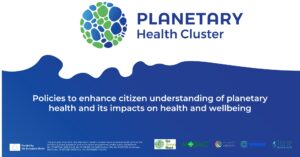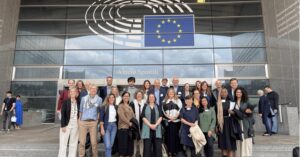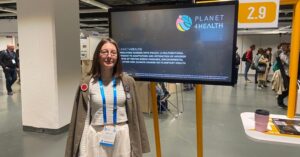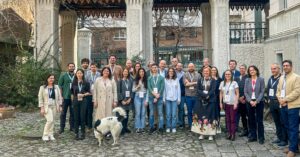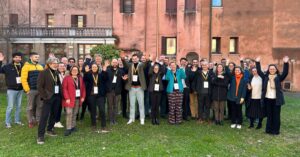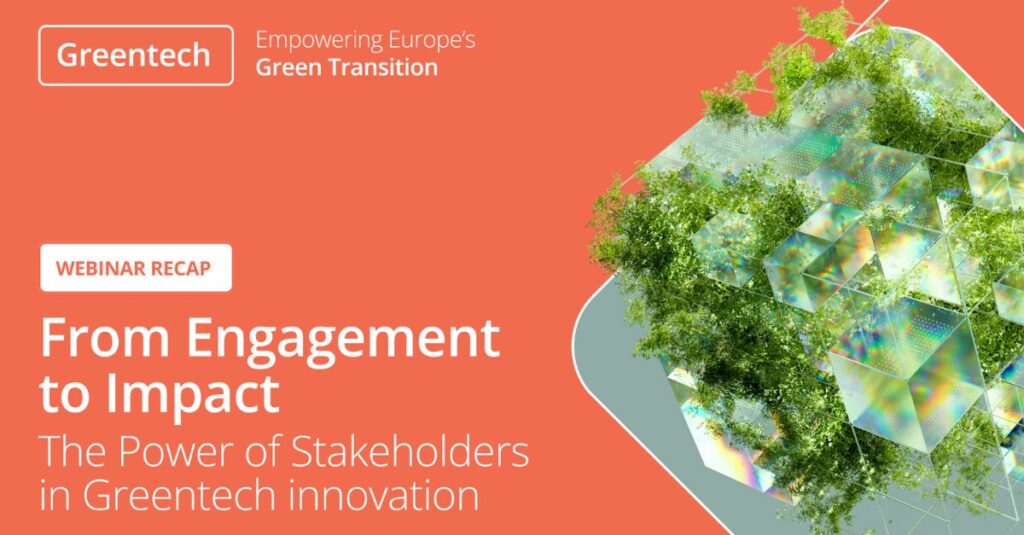Organised by F6S Innovation, this recent webinar brought together leading voices from four EU-funded projects to discuss stakeholder engagement in climate and health initiatives, with PLATE4HEALTH proudly presented by our partners from F6S and SAMRC.
The European Commission’s Perspective: Bridging Research and Reality
Nerea Aizpurua, CLIMOS’ Project Officer at the European Commission’s Health and Digital Executive Agency (HADEA), delivered a keynote emphasising the importance of effective stakeholder engagement for the European Commission. She highlighted the benefit of synergies such as the one developed by the portfolio of Greentech projects run by F6S in collaboration with other partners, with 22 projects and a budget of approximately €150 million.
“When we talk about innovation, especially in the context of EU-funded projects, it’s easy to get caught by the technological advancements and the new solution“, Aizpurua stated. “But the truth is, the most brilliant innovation can fail if they don’t truly meet the needs of the people that they are designed to serve. So, this is where our stakeholders come to connect this gap between the research and lab to the live reality.”
Case Studies: “Challenges, opportunities, and success stories”
The webinar showcased four EU-funded projects case studies – CLIMOS, SESA, PLANET4HEALTH, and REGILIENCE – each demonstrating unique and impactful approaches to stakeholder engagement.
CLIMOS: Tackling Sandfly-Borne Diseases Through Local Community Activities
Carolina Pascaru, Project Manager at F6S, shared how CLIMOS work in understanding and mitigating sandfly-borne diseases heavily relies on engaging a wide range of stakeholders. Through local community activities, the project engaged over 200 participants, including medical doctors, veterinarians, farmers and dog owners.
These co-creation workshops were designed to gather feedback from local communities in 9 countries regarding how they wish to be informed, via Early Warning Systems, about the identification of diseases in humans and animals, and sand fly distribution based on predictive models, enabling them to prepare and protect themselves.
She highlighted the importance of tailored, stakeholder-focused sessions, which involved presenting scenarios and questions in local languages to ensure maximum relevance and accessibility. She also highlighted the value of interactive tools, such as 3D models and microscopes, which captivated participants and extended engagement beyond planned sessions.
PLANET4HEALTH: Translating Science into Policy and Raising Public Awareness
Catia Sousa, Project Manager at F6S, and Caradee Wright, from the South African Medical Research Council, presented their project’s mission. They focused on four case studies and their links between climate change and public health.
Wright shared an example from their South African case study on air pollution and health impacts. She recounted an informal “breakfast” initiative by the South African Medical Research Council, where they directly engaged key government departments, including the National Air Quality Officer and the Environmental Health Directorate, to understand their most pressing challenges. This led to a surprising revelation: the Department of Health was grappling with a severe rat infestation in Pretoria. Initially, this might seem unrelated to air quality, but as Wright explained, the rats thrived due to uncollected waste, which residents then resorted to burning, directly contributing to air pollution. By proactively offering research support to identify illegal waste sites, the Council helped address both the rat problem and the resulting air quality issues.
This approach of actively listening to stakeholders’ immediate, even seemingly disparate, concerns and offering practical research solutions built immense trust.
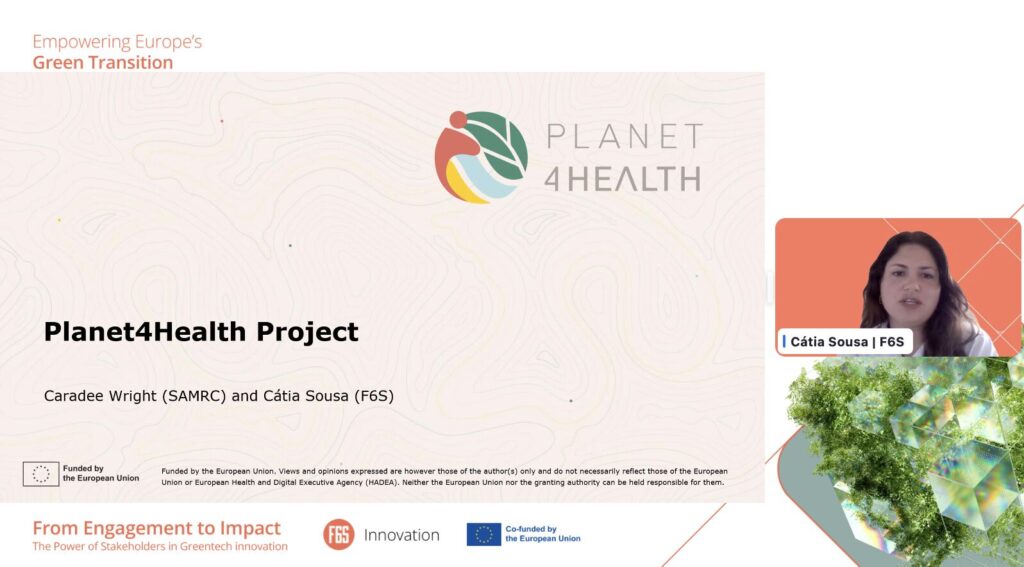
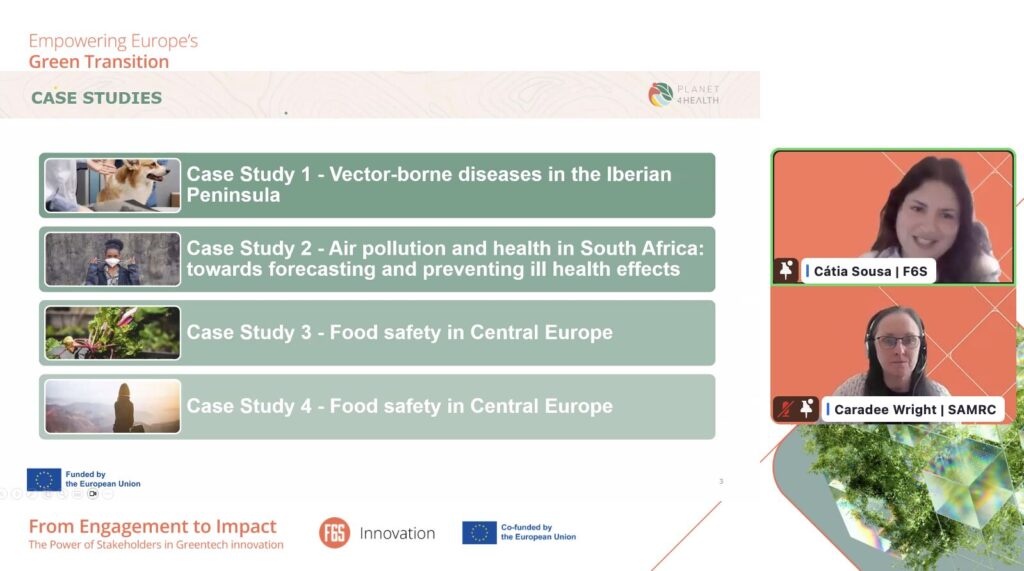
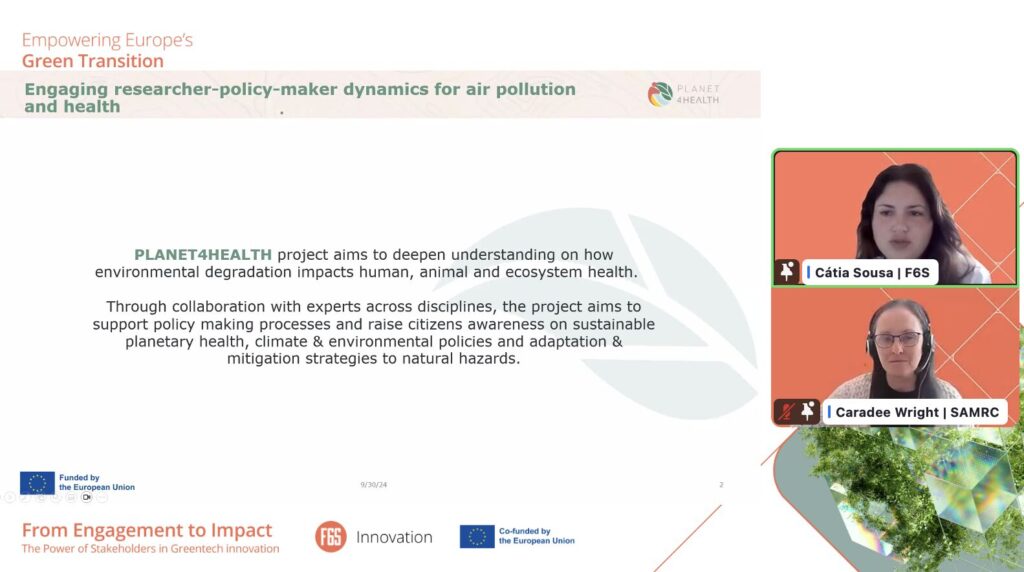
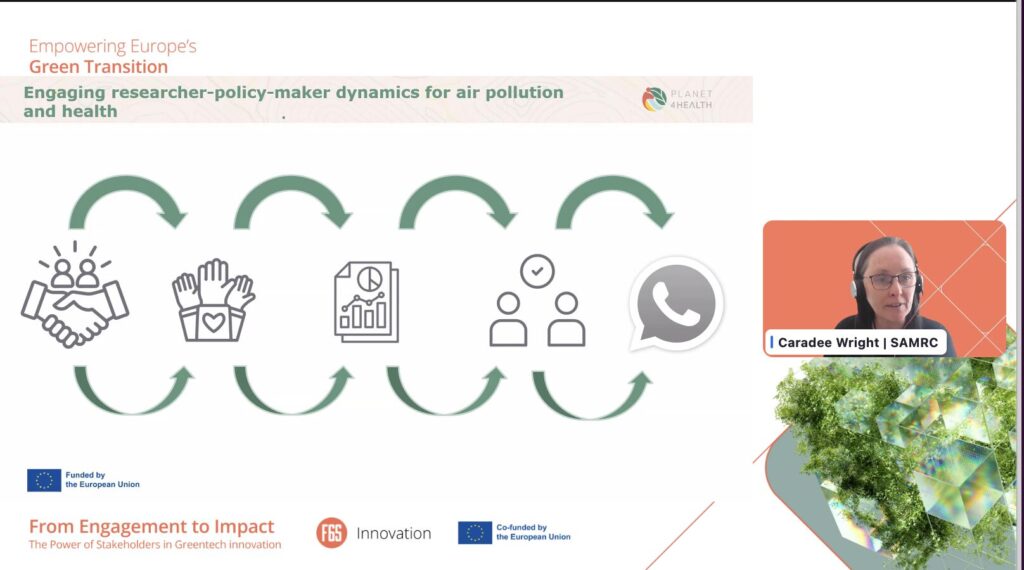
SESA: Empowering Communities with Sustainable Energy Solutions
Natalia Cardona, F6S Project Manager, detailed their ambitious goal of SESA to provide energy access technologies and sustainable business models across nine African countries.
SESA categorises stakeholders by enablers of solutions acceptability and enablers for impact and scalability, they’re linked to specific roles and direct or indirect contributions to the project results. Key inputs include policy roadmaps, business plans and models, and knowledge resources like the SESA Toolbox and online campus offering free courses for sustainable energy technologies, such as smart microgrids, second life EV batteries, electric mobility, rural internet access, clean cooking and solar energy.
She emphasis ed the consortium’s efforts on providing continuous training to ensure technical independence and focused on concrete cases like women-led initiatives to improve technology adoption. Natalia also highlighted the need to assess the best communication tools when working in environments such as rural communities, recognising that even though we live in a highly technological world there are still people with no access to online resources.
REGILIENCE: Shaping Climate Adaptation Policies with Citizen Input
Joanna Makocka, F6S Project Manager for the REGILIENCE project, focused on their work supporting climate adaptation measures and providing support to other sister projects. REGILIENCE aims to understand and address local and regional adaptation needs, collaborating with authorities, citizens, and researchers to identify challenges and provide comprehensive knowledge.
Makocka showcased key tools developed by REGILIENCE, including Quick Guides on natural hazards, available in 10 different languages, to help regions find appropriate climate adaptation solutions. They also offer training sessions for a wide audience, from regional authorities to individual citizens, and a Funding Opportunities Guide.
A citizen survey in Central Macedonia, Greece, is conducted in the local language to assess public awareness of climate adaptation and risks, providing valuable insights to help regional authorities better shape their strategies.
Roundtable Discussion
The session continued with a round-table discussion where representatives from the four projects answered audience questions about the on-site challenges they faced and their suggestions for overcoming them.
- Pip Stewart, a Leishmaniasis Advocacy campaigner and citizen that participated in the CLIMOS local community activities, emphasis ed the “amazing” opportunity to connect with people in the field. For future improvements, Stewart suggested enhancing networking beyond formal sessions. She proposed using AI to “pair” participants based on their needs and offerings, streamlining connections.
- Daniela Nunes (CLIMOS) reinforced the need for differentiated communication strategies based on stakeholder profiles. For citizens, the focus was on personal impact (family, pets), while professionals sought information on preventive measures and policies. Direct contact through existing networks and associations was key.
- Caradee Wright (PLANET4HEALTH) reiterated the importance of co-creation from inception and learning from mistakes. She highlighted the critical need to pre-brief stakeholders on potentially controversial findings to maintain trust and allow them to prepare responses.
- Joanna Makocka (REGILIENCE) highlighted how to translate resources into national languages, moving beyond the English-speaking bubble, and leverage tools like the Horizon Booster.
- Natalia Cardona (SESA) highlighted the reliance on media and direct outreach for different stakeholders, emphasising the importance of understanding socioeconomic and cultural contexts.
Q&A
Regarding Q&A, there was a question from the audience that was not answered due to time constraints:
How can EU projects effectively translate stakeholder feedback into actionable policy recommendations that resonate with regulators?
We reached out to Nerea Aizpurua and she provided two examples that she finds useful in practice.
- Reply to Official “Calls for Evidence”
The European Commission often asks for public input on new or existing policies through ‘Calls for Evidence’ on their ‘Have Your Say’ portal. This is a direct way for our project’s findings and stakeholder feedback to shape future EU laws.
- Why it works: It’s your earliest formal chance to influence policy.
- How: Keep an eye on the ‘Have Your Say’ portal. When a relevant call appears, summarise your project’s evidence and stakeholder insights clearly, focusing on how they solve real problems.
- Example (Open Now!):
- Public Consultation on Towards a circular, regenerative and competitive bioeconomy. This initiative aims to offer solutions for a circular and climate neutral economy, boosting the EU’s prosperity and competitiveness within planetary boundaries.
- Link: Towards a circular, regenerative and competitive bioeconomy
- Engage Directly with Policymakers
Beyond formal calls, build relationships and share your message directly with the people who make decisions.
- Who to target:
- MEPs (Members of the European Parliament): They help create and vote on laws.
- European Commission: They propose the laws.
- National Governments: They implement EU laws.
- How to engage:
- Short Policy Briefs: Create brief, clear summaries (1-2 pages) of your findings and what you recommend.
- Organise Sessions: Host events or briefings. For example, a session at the European Parliament for MEPs and their staff. This creates a direct, informal way to share your knowledge.
- Example of event: “Protecting Health in a Changing Climate” Event with MEP Vytenis Povilas Andriukaitis
A recent high-level roundtable event held at the European Parliament, co-hosted by MEP Vytenis Povilas Andriukaitis. It brought together researchers and policymakers to discuss how EU climate policy can better safeguard human health. The event explicitly focused on the health impacts of climate change, including extreme heat, floods, vector-borne diseases, and the vulnerability of specific populations. It emphasis ed the need for integrated climate and health policies. Took place on 3 June 2025. While it’s a past event, the discussions and recommendations are highly relevant and influential for future policy work.
European Climate and Health Cluster event page.
- Who to target:
In concluding remarks, the panellists underscored the collective agreement on tailoring language to the stakeholder, actively listening to their needs, and being present in the communities where work is being done.
Authors: F6S Innovation team (Greentech synergy)
We at PLATE4HEALTH appreciated the opportunity to participate in this collaborative initiative, reinforcing the importance of stakeholder engagement in climate and health advancements.
